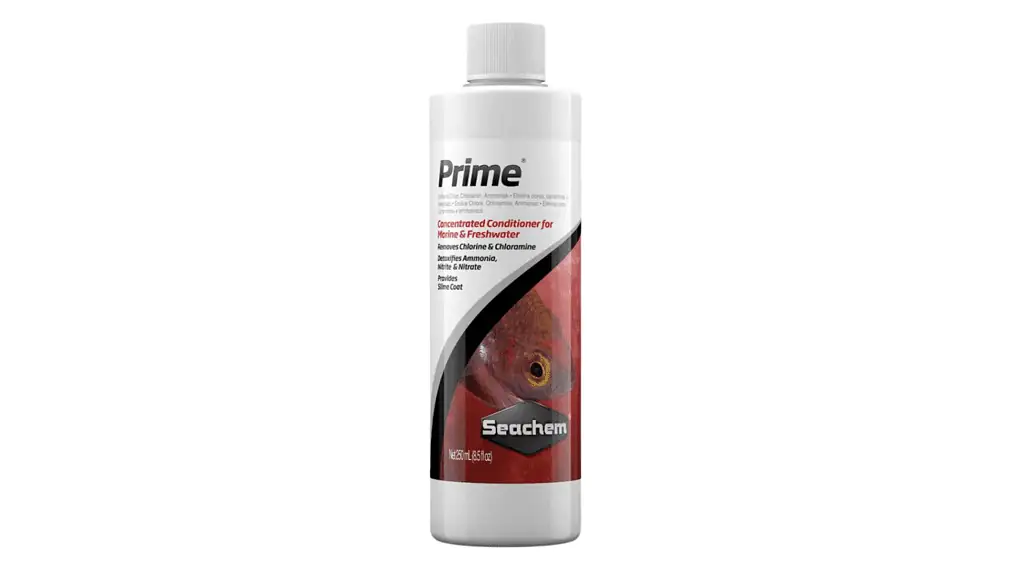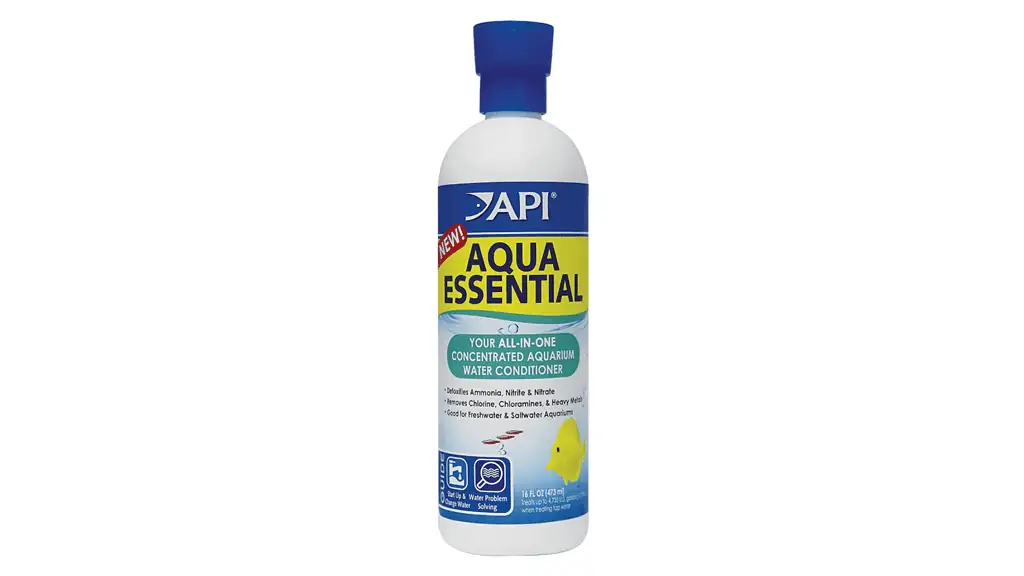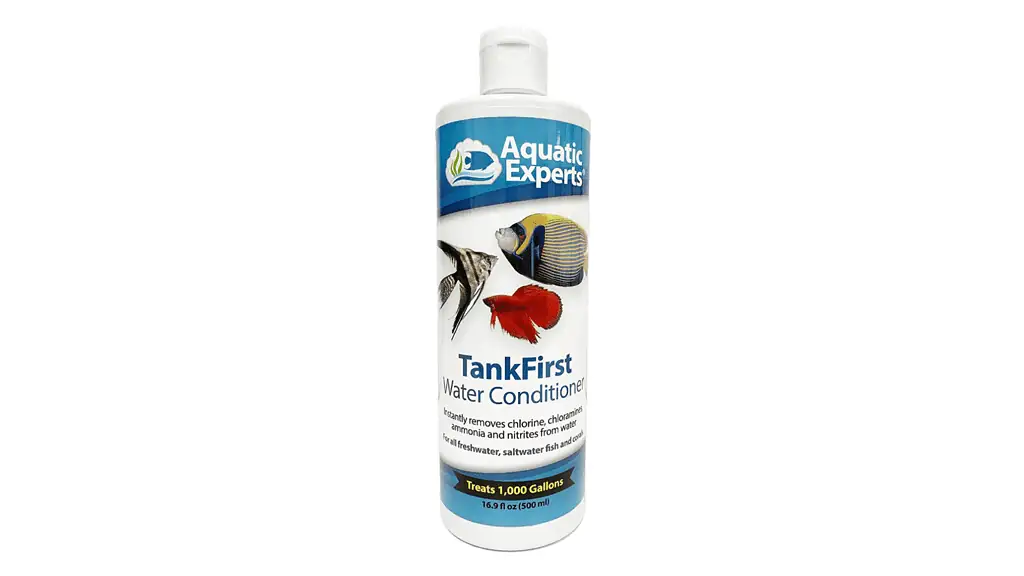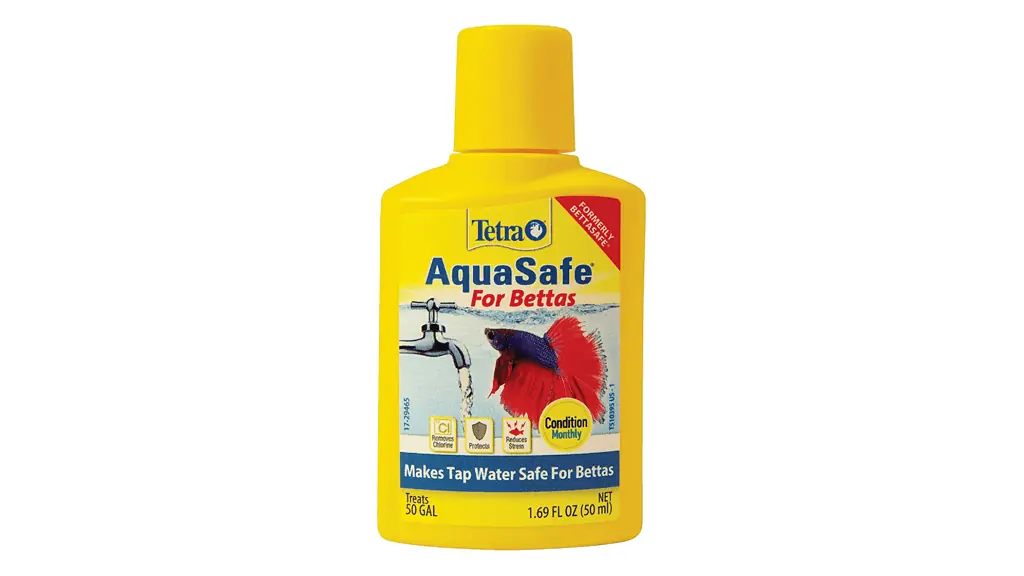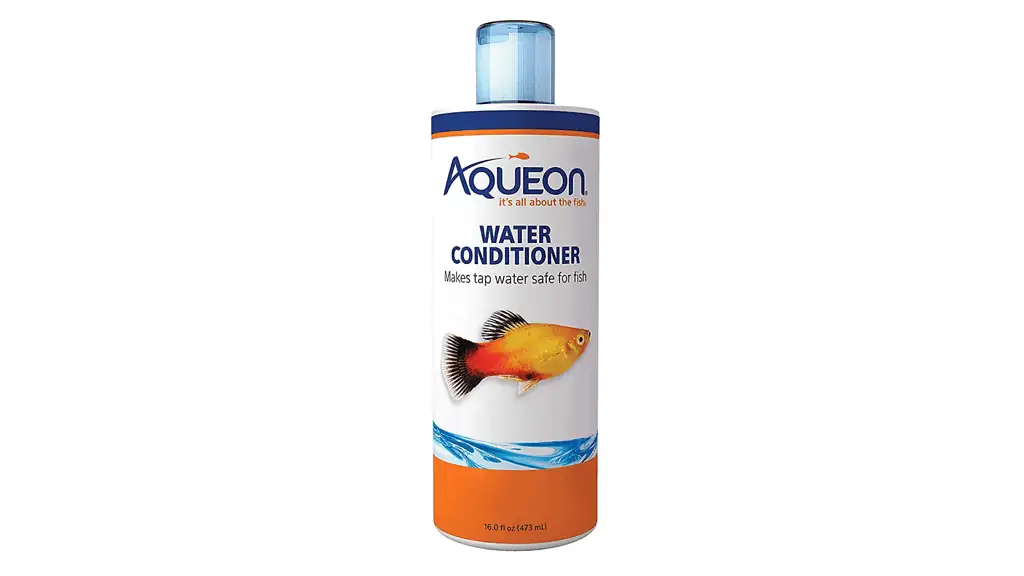A water conditioner is necessary to maintain a clean and healthy betta tank.
Water conditioners remove harmful chemicals in tap water and make it safe for your betta.
With so many options, what is the best water conditioner for betta fish?
Our top choice is Seachem Prime Fresh and Saltwater Conditioner. It effectively removes contaminants and supports a betta’s natural slime coat production.

Our Top 5 Picks of Water Conditioners for Betta Fish
- Seachem Prime Fresh and Saltwater Conditioner (Best Overall)
- API Aqua Essential Water Conditioner (Best for Emergency Treatment)
- TankFirst Complete Aquarium Water Conditioner (Best for Planted Tanks)
- Tetra BettaSafe Aquarium Water Conditioner (Best for Beginners)
- Aqueon Aquarium Water Conditioner (Best Budget-Friendly Option)
The Best Water Conditioners for Betta Fish
Seachem Prime Fresh and Saltwater Conditioner: Best Overall
- Concentrated formula
- Removes chlorine and chloramine
- Detoxifies ammonia, nitrite, and heavy metals
- Supports the natural production of the slime coat
This tap water conditioner is our best overall pick because it works quickly and is highly effective.
Seachem Prime immediately removes chlorine and chloramine from tap water without affecting your tank’s pH levels.
Due to the concentrated formula, Seachem Prime is suitable for both large and small betta tank setups.
Dechlorination usually increases ammonia levels.
The binders in Seachem Prime detoxify ammonia for up to 48 hours. This means the filtration system can remove the ammonia without harming your betta.
Seachem Prime also promotes natural slime coat protection. Unlike other water conditioners, this formula does not contain artificial slime compounds.
You only need two drops per gallon of water when performing water changes. Add the Seachem Prime to the new water bucket before pouring it into the tank.
You may also use a higher dosage of Seachem Prime for the emergency removal of ammonia. Up to five times the original dosage may be added directly to the tank for safely lowering an ammonia spike.
A 100 mL bottle of Seachem Prime treats up to 1,000 gallons of tap water.
API Aqua Essential Water Conditioner: Best For Emergency Treatment
- Highly concentrated formula for larger tanks
- Removes chlorine, chloramine, and heavy metals
- Binds to ammonia, nitrites, and nitrates for 48 hours
- Includes dosage cap
The highly concentrated formula of API Aqua Essential is best for emergency ammonia removal. This product removes chlorine, chloramine, and heavy metals from tap water.
Since this is a concentrated formula, we do not recommend this product for weekly water changes.
We also do not recommend using this formula in betta tanks smaller than 20 gallons. Some users have reported adverse effects in betta tanks under 10 gallons.
Be aware of algae buildup in your aquarium. This product turns algae white quickly, sometimes leading to cloudy tank conditions.
This API water conditioner binds to ammonia and nitrates for 48 hours, allowing complete removal through the filtration system.
The correct dosage for API Aqua Essential is 5 mL per 10 gallons of tank water. One 16-ounce bottle treats up to 4,730 gallons of water.
API Aqua Essential lowers ammonia levels by 20-40 ppm at the correct dosage. This product also lowers nitrate levels by around 40-60 ppm.
Take care when using API Aqua Essentials in a planted tank. Nitrate levels may drop too low for your aquatic plants to thrive.
If your betta tank has elevated water parameters, perform a partial water change 24 hours after treatment for the best results.
TankFirst Complete Aquarium Water Conditioner: Best For Planted Tanks
- No foul odor
- Instantly removes chlorine and chloramine
- Detoxifies ammonia and heavy metals
- Safe for sensitive fish and aquatic plants
TankFirst Complete is our pick for the best water conditioner for planted tanks. The gentle formula does not bind to nitrates, which aid plant growth.
Another benefit of TankFirst Complete is its lack of foul odors.
Many water conditioners produce a sulfur smell as they neutralize chlorine. This smell is not usually noticeable after it dilutes in water, but some people are sensitive to the odor.
Betta fish have a strong sense of smell and taste. The smell of other water conditioners is not harmful to bettas, but they may appreciate the lack of odor in this formula.
TankFirst Complete’s regular formula is not concentrated. This means accidental spills while dosing is not immediately harmful to your betta or plant life.
The dosage instructions for TankFirst Complete recommend one capful or one teaspoon for every 10 gallons of water.
You may add this conditioner directly to your betta tank when ammonia levels are too high.
One 16.9-ounce bottle of TankFirst Complete treats 1,000 gallons of water.
Tetra BettaSafe Aquarium Water Conditioner: Best For Beginners
- Mild formula
- Encourages healthy slime coat production
- Includes essential minerals
- Supports beneficial bacteria
Tetra BettaSafe has a mild formula, making it easy for beginner betta owners to use.
This water conditioner neutralizes chlorine, chloramine, and heavy metals. But, Tetra BettaSafe does not detoxify ammonia or nitrites.
This formula comes in a 1.69-ounce bottle and is only available in one size. Since this is only enough product for treating 50 gallons, it is not ideal for weekly water changes for larger betta tanks.
The ideal tank size for getting the most out of this product is 10 gallons.
Tetra BettaSafe has additives for slime coat production. A healthy slime coat protects your betta from harmful bacteria and toxins.
Essential minerals are also included, which is beneficial if tap water lacks these nutrients.
The recommended dosage of this product is 14 drops per gallon of water.
When cycling a new tank with this water conditioner, two capfuls are enough for 10 gallons.
Tetra BettaSafe is a good water conditioner for beginners because adding too much to the tank will not harm your betta fish.
The product is also inexpensive and easy to use.
Aqueon Aquarium Water Conditioner: Best Budget-Friendly Option
- Neutralizes chlorine and chloramines
- Helps restore the natural slime coat
- Detoxifies ammonia and heavy metals
- Convenient dosage cap
This Aqueon water conditioner is the most budget-friendly option on our list.
It comes in a 16-ounce bottle, and it is long-lasting at a dosage of 10 drops per gallon of water.
When dosing a new 10-gallon tank, use 5 mL of the water conditioner. The cap on the bottle has convenient markings for easy measuring.
This water conditioner instantly neutralizes chlorine and chloramine in your tap water.
Aqueon Water Conditioner keeps your betta’s tank water clear as it detoxifies ammonia and heavy metals.
Adding this water conditioner to your tank helps supplement a stressed betta.
This product is also safe to use for planted tanks.
What Is a Water Conditioner and Why Does My Betta Need One?
Most municipal tap water contains chlorine or chloramine.
While these chemicals prevent bacteria in our drinking water, they harm betta fish.
Chlorine in tap water causes chemical burns to a betta’s gills and skin. A betta exposed to chlorinated water also has difficulty breathing and may suffocate.
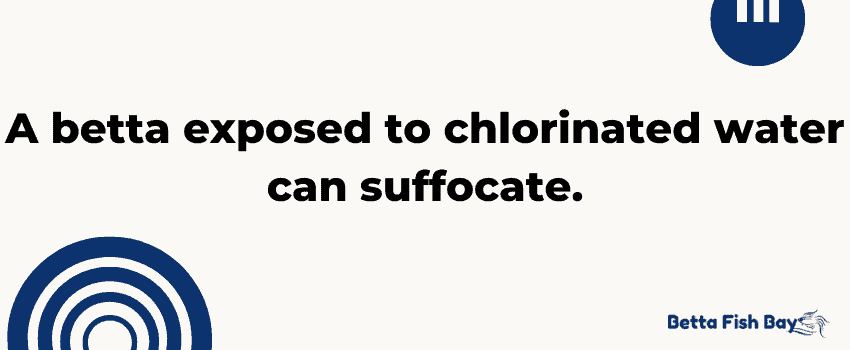
A water conditioner containing a dechlorinator removes these harmful chemicals and makes tap water safe for betta fish.
Well water is not safe either, even if it is not chlorinated. Heavy metals are usually present in well water and are also harmful to your betta.
Betta fish need specific water parameters for good health. The ideal water parameters for bettas include:
- Temperature: 78-80° degrees Fahrenheit (27° C)
- pH: 6.5-7
- Ammonia: 0 ppm
- Nitrites: 0 ppm
- Nitrates: <40 ppm
Maintaining consistent water parameters is crucial to your betta’s health. Sudden fluctuations in temperature or pH levels may affect your betta’s eating habits and lower its immune system.
Read our article on setting up a betta tank to learn more about water parameters and how the nitrogen cycle works.
No amount of ammonia or nitrites is safe for bettas. These toxins cause chemical burns, blood disorders, and breathing issues.
High levels of ammonia or nitrites are fatal for betta fish. Low levels of nitrates are safe for bettas and encourage plant growth.
Water conditioners containing beneficial bacteria promote a healthy tank ecosystem.
Beneficial bacteria are a crucial part of an aquarium’s nitrogen cycle.
During the nitrogen cycle, ammonia converts to nitrites and then converts to less harmful nitrates.
Daily water changes remove some toxins and prevent an ammonia spike.
Never remove more than 20% of the water from your betta tank unless it is an emergency. Removing too much water disrupts the nitrogen cycle, making it difficult to maintain healthy water quality.
Ingredients To Look For in a Water Conditioner for Bettas
The most common ingredient in betta water conditioners is sodium thiosulfate.
Sodium thiosulfate neutralizes chlorine, making it harmless to your betta.
When chloramine neutralizes, ammonia is leftover from the process. If your water contains chloramine, check the water conditioner label to ensure it detoxifies ammonia.
Many high-quality water conditioners, such as Seachem Prime, contain binding agents. It binds ammonia and nitrite for up to 48 hours.
This binding process detoxifies ammonia and nitrite, giving your biofilters time to process these toxins.
Some water conditioners, like Tetra BettaSafe, contain slime additives like aloe or green tea extract. These additives promote a slime coat on your betta, which protects the fish from bacteria and diseases.
Water conditioners with pH buffers raise or lower your tank’s pH levels, depending on the product.
Most betta fish water conditioners are liquid, but tablets are also available.
Water conditioner tablets and liquids are equally effective, but tablets make dosing easier.
The main downside to tablets is the time it takes for them to dissolve. Liquid water conditioners begin working immediately.
How To Use a Water Conditioner for Betta Fish
You may add water conditioners to a new bucket of water or directly to the tank.
The dosage of the water conditioner depends on the method you use.
When adding a water conditioner to a new bucket of water, follow dosage instructions for how many gallons are in the bucket.
If you add water conditioner to the tank before adding the new water, you must dose for the entire tank volume.
For example, if your betta tank holds 10 gallons and you do a 20% water change, you only need to add the recommended number of drops needed for two gallons.
To dose the tank before adding the new water, follow the dosing instructions for 10 gallons. This dosage usually equals 5 mL or one teaspoon.
Many water conditioners have caps with measurements for easy dosing. Use a pipette for measuring smaller amounts.
This helpful YouTube video shows the step-by-step process of doing a partial water change and adding a water conditioner to your betta tank.

How Often To Use a Water Conditioner for a Betta Fish
You must use a water conditioner when adding water to your betta tank. Tap water chemicals cause skin and gill burns, making it difficult for bettas to breathe.
Partial water changes are needed every week to maintain water parameters. This means you must use the water conditioner every week.
A water conditioner is also necessary when setting up a new betta tank. The water conditioner removes harmful chlorine and encourages the nitrogen cycle process.
Always follow the dosing instructions on your bottle of water conditioner.
Most betta water conditioners have caps with measurements marked in milliliters. Each bottle of water conditioner may have different measuring guidelines, so pay attention to the dosage requirements.
Some water conditioners have a concentrated formula, meaning you need less of the product for effectiveness.
The dechlorination process produces ammonia if your tap water has chloramides.
Many water conditioners bind toxic ammonia, so the biological filtration cycle has time to break it down.
Adding too much water conditioner may release more ammonia than the biofilters can handle. This causes a dangerous ammonia spike.
If there is no more chlorine or chloramides to neutralize, the water conditioner bonds with oxygen molecules. Without enough oxygen in the water, your betta will suffocate and die.
Are There Any Alternatives to Using a Water Conditioner?
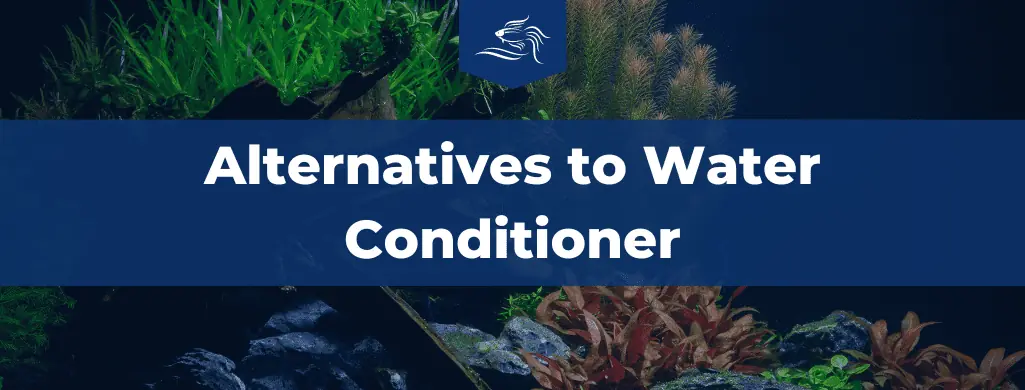
There are several alternatives to using a suitable water conditioner for your betta tank. Some are more effective than others.
We recommend attempting these alternative methods on a bucket of clean water only.
Aside from carbon filters, treating your entire betta tank with one of these methods could be dangerous for your fish.
Boiling
Boiling water for 20-25 minutes effectively removes chlorine from tap water. But, this method does not neutralize harmful chloramine.
This method is recommended only for smaller betta tanks and if your tap water does not contain chloramines. Your water company can tell you if your tap water contains chloramine.
This method is unpractical if your betta tank is 20 gallons or larger.
Allow the water to cool to your tank’s temperature before adding it to the aquarium. If you do not allow the water to cool, you risk overheating your betta.
UV Light
Ultraviolet light removes chlorine and neutralizes chloramine.
UV lights for fish tanks are inexpensive and often used to kill bacteria and discourage algae bloom.
The main issue with using a UV light for dechlorination is the presence of other harmful chemicals. UV light does not neutralize other chemicals or heavy metals in tap water.
Another problem is the time it takes for UV light to work. UV lighting may take more than 24 hours to dechlorinate your tap water.
This extended time is not ideal, especially when performing weekly water changes.
This method is too unreliable for us to recommend.
Vitamin C
Ascorbic acid, or vitamin C, neutralizes chlorine and chloramine.
You only need one teaspoon of vitamin C for every gallon of water you add to the betta tank. Vitamin C tablets are also available for easy measuring.
While vitamin C seems like a cheap and easy solution to dechlorination, it may negatively affect your water’s pH.
Vitamin C also does not have the benefit of removing ammonia or heavy metals from tap water.
Carbon Filter
Many fish owners use carbon filters in their tanks. A carbon filter safely removes chlorine, heavy metals, and other chemicals from the water.
A carbon filter is not practical for weekly water changes.
You would have to set up a separate tank with a carbon filter for the new water and test it to ensure the contaminants are removed.
This method is very time-consuming and labor-intensive.
Best Practices for Water Changes and Aquarium Maintenance
Weekly water changes are a necessary step in maintaining consistent water parameters.
Removing all possible contaminants is impossible for any tank filter.
Even if your tank is fully cycled, you still have to worry about nitrate buildup.
A partial water change removes harmful contaminants and keeps the nitrogen cycle running smoothly.
We recommend changing no more than 20% of your tank water at one time. Removing more than 20% of the water disrupts the nitrogen cycle and may cause issues like ammonia spikes.
Water changes also allow you to clean your tank properly.
The siphon allows you to vacuum fish waste and other debris from the substrate.
Removing algae from the sides of your betta tank is also an important step. Use a magnetic aquarium scraper to remove algae every time you perform a water change easily.
Watch this informative YouTube video for step-by-step instructions on cleaning your betta tank.

Ensuring Betta Fish Have a Safe and Comfortable Environment
Maintaining a healthy environment for your betta goes beyond regular water changes and cleaning.
Your betta needs a nutritious, varied diet with lots of protein for a robust immune system.
Never overfeed your betta. Overfeeding leads to obesity and other health issues.
Feeding your betta too much also creates excess waste. Fish waste and leftover betta food build up on your substrate, creating harmful toxins in the water.
Consistent water parameters are also crucial to your betta’s health.
Keep water temperatures and pH levels stable for your betta. Sudden fluctuations in water parameters cause discomfort and stress, which lowers your betta’s immune system.
Our helpful article on maintaining water parameters provides tips on ensuring optimal water quality for your betta fish.
Our Final Roundup of the Best Water Conditioners for Bettas
We chose Seachem Prime Fresh and Saltwater Conditioner because its concentrated formula effectively removes chlorine, chloramine, and heavy metals from tap water.
This water conditioner also contains binders, which detoxify harmful ammonia and nitrites.
If you are new to fish keeping, Tetra BettaSafe Aquarium Water Conditioner is a mild, user-friendly formula.
The formula also contains beneficial minerals and a slime additive for your betta’s health.
The large bottle size and small dosage make this water conditioner last long.
Frequently Asked Questions
Do betta fish need special water conditioners?
Water conditioners for betta fish do not need any special features or ingredients. Additives like aloe or green tea extract are good for your betta’s health but are not essential. A clean tank and a nutritious diet keep your betta fish healthy, no matter which water conditioner you choose.
Can you use any water conditioner for bettas?
As long as a water conditioner is formulated for fresh water, it is safe for your betta. Some water conditioners work better than others, but additives are often unnecessary.
How often should I put a water conditioner in my betta tank?
You must use a water conditioner any time you perform a water change.
Tap water contains harmful chemicals, which cause tissue irritation and may lead to death.
Removing these toxins with a water conditioner is vital. Besides weekly water changes, you may add a water conditioner to your betta tank to control ammonia spikes and other water parameter issues.
Always read the label to ensure the water conditioner is right for your needs.

